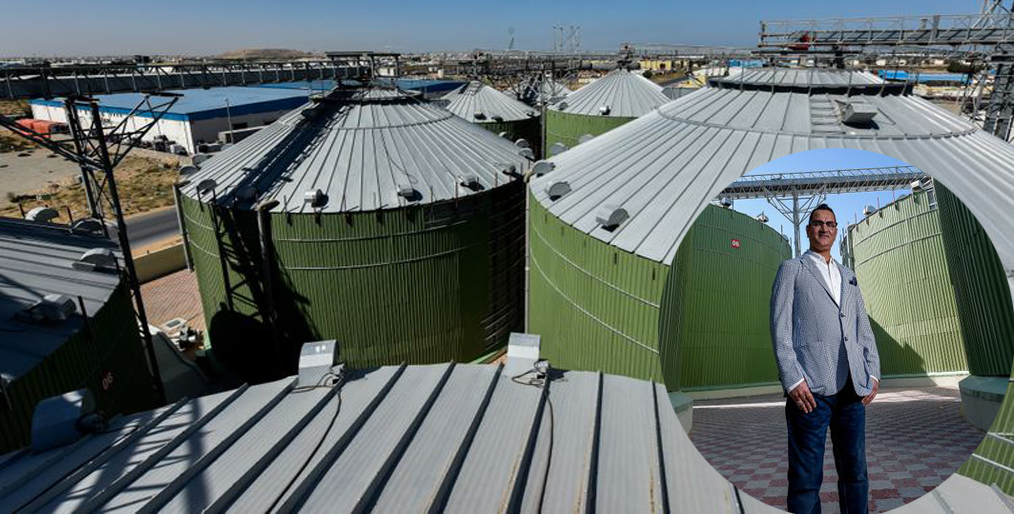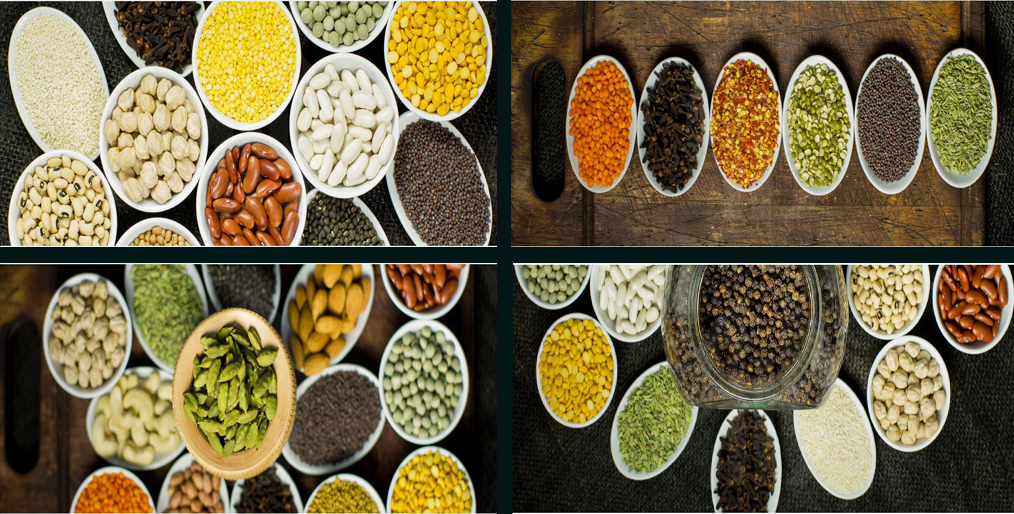
[caption id="attachment_4066" align="aligncenter" width="1014"] The new food silos owned by Arab India Spices at Hamriyah Free Zone, on inset Harish Tahiliani. Picture: Collected [/caption]
GFMM desk: How many giant silos will it take to stock all pulses in the UAE for six months? The answer is - 12 silos with a combined storage capacity of 52,000 tons.
This answer was received by Harish Tahiliani, Managing Director of Ajman-based Arab India Spices. He should know because his company has just spent Dh200 million to build 12 of them, at the Hamriyah Free Zone in Sharjah.
“That’s right, 52,000 tonnes of raw material storage should be enough to meet demand for up to six months,” said Tahiliani, ahead of the commissioning of the silos this week. “The initial plan was to lease out some of the silos to third-parties… but now, we intend to retain all of them for our own use.
“The plan is to raise capacity at our lentils and pulses processing plant in Ajman from the current 700 tonnes a day to about 1,000 tonnes in phases. When the expansion comes on line, we will need all of the extra storage the silos can offer for the raw materials.”
Arab India Spices, which is headquartered in the western Indian state of Gujarat, launched its Ajman operations in 2006. Silos are mainly used in the agricultural industry to harvest wheat and grain in large containers.
[caption id="attachment_4067" align="aligncenter" width="1014"]
The new food silos owned by Arab India Spices at Hamriyah Free Zone, on inset Harish Tahiliani. Picture: Collected [/caption]
GFMM desk: How many giant silos will it take to stock all pulses in the UAE for six months? The answer is - 12 silos with a combined storage capacity of 52,000 tons.
This answer was received by Harish Tahiliani, Managing Director of Ajman-based Arab India Spices. He should know because his company has just spent Dh200 million to build 12 of them, at the Hamriyah Free Zone in Sharjah.
“That’s right, 52,000 tonnes of raw material storage should be enough to meet demand for up to six months,” said Tahiliani, ahead of the commissioning of the silos this week. “The initial plan was to lease out some of the silos to third-parties… but now, we intend to retain all of them for our own use.
“The plan is to raise capacity at our lentils and pulses processing plant in Ajman from the current 700 tonnes a day to about 1,000 tonnes in phases. When the expansion comes on line, we will need all of the extra storage the silos can offer for the raw materials.”
Arab India Spices, which is headquartered in the western Indian state of Gujarat, launched its Ajman operations in 2006. Silos are mainly used in the agricultural industry to harvest wheat and grain in large containers.
[caption id="attachment_4067" align="aligncenter" width="1014"] File Picture[/caption]
How big are these?
Eight of the 12 contain capacity of 5,000 tonnes per thousand and the remaining four 3,000 tonnes. Does the company also plan to go into rice? Tahiliani denies this, saying it does not fit with their models, and there are several brands with a presence already involved in the region and other export markets.
The company’s ‘777’ brand is available across the Gulf markets, and the intention now is to gradually extend shipping opportunities to Africa. Again, the silos and the additional capacity at the Ajman plant will come in handy.
“There’s always opportunity and uncertainty in equal measure when it comes to Africa,” said Tahiliani. “But what’s undeniable is the huge demand that exists there for food essentials. This is why one reason we decided to have the silos in Hamriyah – the storage and transportation costs make it possible to make a move into Africa.”
Period of uncertainty
For the food commodity markets, the immediate future will bring in a bit of turmoil. Much depends on how quickly – and well – China recovers from the bout with the virus. “China on its own is not into food commodities in a big way – but still the effect will be felt because China sucks up a lot of the global shipping container movements,” said Tahiliani.
Source: Online/SZK
File Picture[/caption]
How big are these?
Eight of the 12 contain capacity of 5,000 tonnes per thousand and the remaining four 3,000 tonnes. Does the company also plan to go into rice? Tahiliani denies this, saying it does not fit with their models, and there are several brands with a presence already involved in the region and other export markets.
The company’s ‘777’ brand is available across the Gulf markets, and the intention now is to gradually extend shipping opportunities to Africa. Again, the silos and the additional capacity at the Ajman plant will come in handy.
“There’s always opportunity and uncertainty in equal measure when it comes to Africa,” said Tahiliani. “But what’s undeniable is the huge demand that exists there for food essentials. This is why one reason we decided to have the silos in Hamriyah – the storage and transportation costs make it possible to make a move into Africa.”
Period of uncertainty
For the food commodity markets, the immediate future will bring in a bit of turmoil. Much depends on how quickly – and well – China recovers from the bout with the virus. “China on its own is not into food commodities in a big way – but still the effect will be felt because China sucks up a lot of the global shipping container movements,” said Tahiliani.
Source: Online/SZK
Comment Now